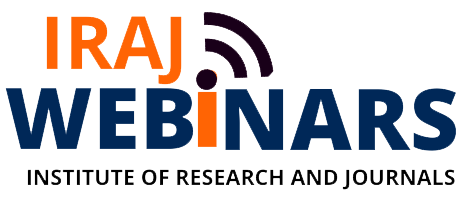
- webinar.iraj@gmail.com
- +91-8895689682

Welcome to the official website of the International Webinar on Climate Project on Early Warning System, Anticipatory Actions and Climate Actions. (IWCPEWAACA-2022) (IWCPEWAACA-2022). The conference/Webinar will be held online. The Webinar will be organized by WRFASE in Association with Institute of Research and Journals-IRAJ on 20th Sep 2022.
This webinar will uncover the Pakistan. Providing operation and food security and livelihood, climate change mitigation and adoption actions, early warning early action, anticipatory action, emergency response, early warning system technical& implementation backing to UN Agencies Partners, Government Departments, Stakeholders and reporting to donors.

Note : Only attendees who will attend the whole Webinar will be eligible to receive the certificate of Participation.
International Webinar on Climate Project on Early Warning System, Anticipatory Actions and Climate Actions. (IWCPEWAACA-2022) (IWCPEWAACA-2022)
will be an engaging online event where World’s round and eminent industry and academic expert speakers will deliver the presentation to a large audience who participate by submitting questions, responding to polls, and using other available interactive tools. It is an event held on the Coordination with national disaster authority NDMA, provincial disaster management authorities PDMA, nutrition, food security, agriculture, livestock, water management, and other relevant government stakeholders and district administration in Sindh province for UN Agencies. Implementing and supervising climate change, emergency and resilience related projects in Sindh. The projects aims to respond to protect from disasters through early warning systems to inform evidence-based decisions on early / anticipatory / climate action to prevent or mitigate the impact of drought / flood on agricultural livelihoods and food security, life-saving needs of COVID and flood affected families with nutrition-sensitive, multi-sector response activities. Support FSL (Cash Intervention, Agriculture and Livestock activities), WASH in Sindh. Participating in country strategic planning, and providing technical insight & innovative ideas in program development and proposals development, Represent UN Agencies at Country and provincial level in working groups and clusters. Currently working on Flood Early Warning System and Climate Actions with government institutes and stakeholders
Features of the webinar
The objective features of webinars are the Pakistan has been enduring severe monsoon weather since June 2022, which saw are a weighted rainfall 67 per cent above normal levels in that month alone. As of 27 August, rainfall in the country is equivalent to 2.9 times the national 30-year average. This has caused widespread flooding and landslides, with severe repercussions for human lives, property and infrastructure. To date, 72 districts across Pakistan have been declared ‘calamity hit’ by the Government of Pakistan. These numbers remain dynamic given the ongoing rains, and the number of calamity-declared districts is expected to increase.
Southern and central Pakistan have been most affected, particularly Balochistan and Sindh provinces. Balochistan has received 5.1 times its 30-year average rainfall as of 27 August, while Sindh’s is 5.7 times its 30-year average.1 Hill torrents occurred in Balochistan, Sindh and south Punjab, while most districts of Sindh were inundated, with water unlikely to recede soon. According to the National Disaster Management Authority (NDMA), the higher rainfall in Balochistan represents a change in the monsoon pattern, as the province is not usually affected by the monsoon.


Professor at Food and Agriculture Organization of the United Nations (FAO) –Karachi, Sindh, Pakistan
+91-8280047516 (Call / Whatsapp)
webinar.iraj@gmail.com
Copyright © 2024. All right Reserved | IRAJ.IN